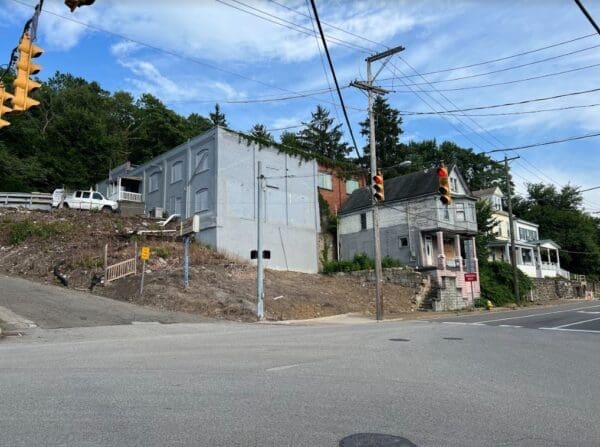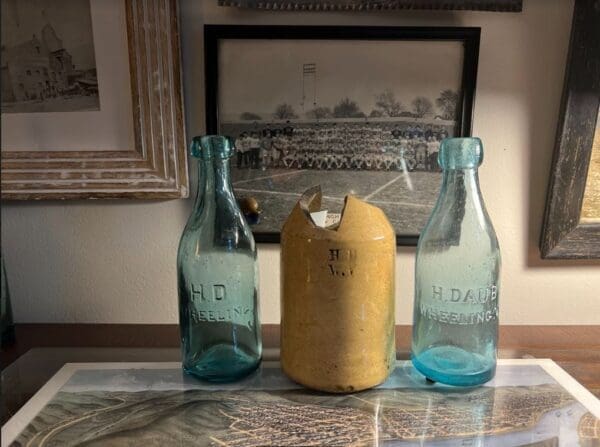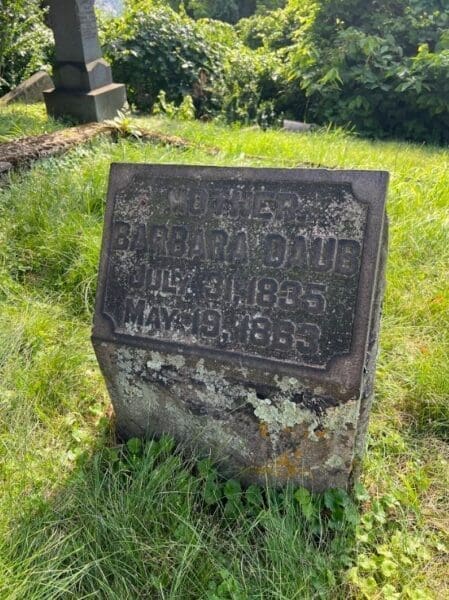Henry Daub was a saloon keeper, brewer, and bottler operating in North Wheeling at 7th street, near the foot of Wheeling Hill. Today this building is occupied by Mountain Aire Heating and Cooling, which also once housed the Kenney Brewery and later the Wheeling Decorating Company.
Daub had his ups and downs in the brewing industry, later with the mineral water business, and his lifestyle was mixed with hard-drinking and gambling.
And Daub faced numerous run-ins with the law. Some instances were minor where he faced light fines. For example, in 1866 he was fined $1 for neglecting sanitary conditions on his premises. Daub’s drinking also appeared to get him into trouble quite often where he faced numerous disorderly conduct charges.
In 1872, Daub made headlines when a man named Moore was being followed by two men (whose names were never learned) and claimed they wanted to “whip” him. After avoiding the two men all day, Moore entered Daub’s saloon on Main Street with a friend to roll a game of tenpins. Moore was told that only club members could use the alleys. This led to a heated exchange, a scuffle, and a man striking Moore.
Moore returned the blow which then led to an all-out brawl. Daub stepped in and started beating Moore in the head with a club. Moore sustained severe injuries around his arms, legs, and his scalp was “laid open.” The article describing the saloon fight goes on to say that so many stories are circulating “about the affair that we hardly know which to believe.”
The article ended by saying that Moore’s injuries “received the necessary surgical care.”
In the 1870s, Daub was also charged numerous times for selling liquor to minors. In 1874, he was fined a large sum of $20 for selling liquor on Sunday.
His first wife had died in 1863 and Daub later remarried, but faced much of the same hardships during his second marriage. Prior to his death, for about 2 years Daub, suffered numerous illnesses and his financial problems continued to mount.

Rejection
Because of Daub’s business interest and popularity around town, he was a member of numerous fraternal and secret organizations. Those groups sympathized with Daub and even helped sustain him during a three-month stay at the hospital. After being discharged he traveled, visiting relatives who loaned him money to return to Wheeling. Upon his return, he went to visit his second wife at 1519 Main Street where she kept a saloon. As a friend of Daub’s would recount, he tried to make peace with her, but was put out of the house and not allowed to enter again.
Daub left and wandered around town meeting friends and drinking at saloons. On January 4, 1878, Daub told a few of those men that he intended on shooting himself and planned to die on his first wife’s grave as she had been his only friend in the world. To one of those friends he even displayed a small pistol which he said he would use to commit the act. Daub even demonstrated how he would do it.
His friend, Mr. Lanfred, unsuccessfully tried to take the gun away from Daub. Lanfred even went to the police and asked them to lock up Daub because he feared he may try to commit some rash act. Before anything could be done, Daub walked out of the saloon and started walking up Market Street. He was seen near Shallcross’s Stable at about 5 p.m. Thursday evening and going toward Mount Wood Cemetery in bitter cold and snowy conditions.
The next day his friend went looking for Daub. When he didn’t have any luck he stopped by his wife’s saloon, and when Daub wasn’t there, he feared he had actually may have gone through with the act. While walking to Mount Wood, Lanfred met one of his friends, Will Bailey, along the way and informed him of his intention of going to “hunt for a dead man.”
Bailey had a sleigh and both men went on their way to Mount Wood Cemetery.

A Chance Wasted
They arrived at the cemetery and to the spot where Daub was believed to have committed the act. The search did not take long, and after scraping away some snow they found Daub’s body lying across the grave of his first wife. The police were immediately summoned to the site and after collecting evidence and testimony it was decided that Henry Daub came to his death by a pistol shot fired by his own hand.
The pistol was a small Colt seven-shot pocket revolver and was found with three cylinders loaded and one bullet was found in Daub directly above his heart. Daub left behind a large family of children raised by both his first and second wives, the latter who was a widow at the time Daub married her.
After his death, the friends of Daub’s second wife claimed that the “statements made by the newspapers of her harsh treatment of her husband have done her great injustice.” Her friends went on to describe how Daub, on three separate occasions left his family and took all of the earnings from the saloon which made it very difficult for her to survive while raising seven children. They wanted it to be known that Daub was a “dissipated man who squandered all of his wife’s earnings, and neglected his family.”
This same newspaper article also stated a correction that the fraternal organization Order of the Druids did not pay for Daub’s internment at Mount Wood Cemetery. He did belong to the organization but was just recently expelled as a member. Daub was also a member of the Knights of Pythias, and on the night he committed suicide, charges were being brought against him for immoral and improper conduct. Despite these allegations, the Knights of Pythias “took charge of his remains and had them properly interred.”
The story of Henry Daub has always struck me as interesting. Here was a man who appeared to have all of the potential in the world with successful business ventures and support from friends and family. One can only imagine what thoughts were going through his mind on that cold January night as he made his trek through the snow to Mount Wood Cemetery.
Let Daub’s story be a reminder to everyone that living a lifestyle such as his can ultimately lead to demise.



Great story Ryan!